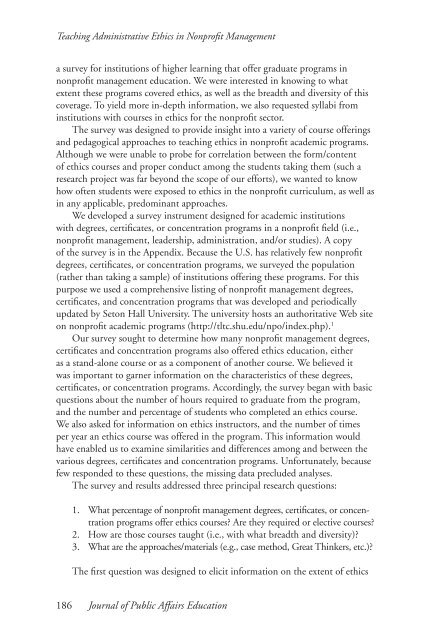JOURNAL OF PUBLIC AFFAIRS EDUCATION - Naspaa
JOURNAL OF PUBLIC AFFAIRS EDUCATION - Naspaa
JOURNAL OF PUBLIC AFFAIRS EDUCATION - Naspaa
Create successful ePaper yourself
Turn your PDF publications into a flip-book with our unique Google optimized e-Paper software.
Teaching Administrative Ethics in Nonprofit Managementa survey for institutions of higher learning that offer graduate programs innonprofit management education. We were interested in knowing to whatextent these programs covered ethics, as well as the breadth and diversity of thiscoverage. To yield more in-depth information, we also requested syllabi frominstitutions with courses in ethics for the nonprofit sector.The survey was designed to provide insight into a variety of course offeringsand pedagogical approaches to teaching ethics in nonprofit academic programs.Although we were unable to probe for correlation between the form/contentof ethics courses and proper conduct among the students taking them (such aresearch project was far beyond the scope of our efforts), we wanted to knowhow often students were exposed to ethics in the nonprofit curriculum, as well asin any applicable, predominant approaches.We developed a survey instrument designed for academic institutionswith degrees, certificates, or concentration programs in a nonprofit field (i.e.,nonprofit management, leadership, administration, and/or studies). A copyof the survey is in the Appendix. Because the U.S. has relatively few nonprofitdegrees, certificates, or concentration programs, we surveyed the population(rather than taking a sample) of institutions offering these programs. For thispurpose we used a comprehensive listing of nonprofit management degrees,certificates, and concentration programs that was developed and periodicallyupdated by Seton Hall University. The university hosts an authoritative Web siteon nonprofit academic programs (http://tltc.shu.edu/npo/index.php). 1Our survey sought to determine how many nonprofit management degrees,certificates and concentration programs also offered ethics education, eitheras a stand-alone course or as a component of another course. We believed itwas important to garner information on the characteristics of these degrees,certificates, or concentration programs. Accordingly, the survey began with basicquestions about the number of hours required to graduate from the program,and the number and percentage of students who completed an ethics course.We also asked for information on ethics instructors, and the number of timesper year an ethics course was offered in the program. This information wouldhave enabled us to examine similarities and differences among and between thevarious degrees, certificates and concentration programs. Unfortunately, becausefew responded to these questions, the missing data precluded analyses.The survey and results addressed three principal research questions:1. What percentage of nonprofit management degrees, certificates, or concentrationprograms offer ethics courses? Are they required or elective courses?2. How are those courses taught (i.e., with what breadth and diversity)?3. What are the approaches/materials (e.g., case method, Great Thinkers, etc.)?The first question was designed to elicit information on the extent of ethics186 Journal of Public Affairs Education
















